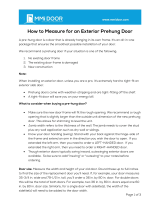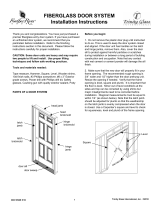
Before you begin
Remove the packaging and take the following precautions with the door:
1. Prehung interior doors can be installed immediately. If you are not installing immediately, store your door flat on a level surface, in a clean, dry,
well-ventilated area.
2. Avoid excessive warping or dr
ying. Do not store or install your prehung door in a damp, or freshly dry-walled building. Keep the door at least 10 feet
away from heating registers, and away from direct sunlight.
3. Handle your prehung door with clean hands or gloves, and lift rather than drag it. The precautions you take now will make finishing and
installation much easier later. (Consult your retailer for information on finishing instructions.)
Cross section of a typical door installation
All parts are seen in position in this horizontal section drawing. Note that the
hinge pin protrudes about 1/8" beyond the door; there are both left-hand and
right-hand hinges for doors that open from either the left or the right.
Doorstops fit snugly against the closed door (they are installed with the door
in the closed position). The casing is set back slightly from the edge of the
jamb to allow removal of the hinge pin. The leading edge of the door is beveled
to give the door clearance to swing without leaving a visible gap between the
closed door and the jamb on the outside. Prehung doors come hinged to their
jambs.
Tools Required
All you need is a hammer, Phillips screwdriver, 24" level, 24" framing square,
nail set, wooden shims, 8d and 16d finish nails, putty knife and wood filler.
Step 1. Rough Opening
Before you start, check to make sure that the rough opening is 1/2" wider than
the unit width & 1/2" higher than the unit height. This will allow you to shim
and square the door frame easily. Door casing will cover the gap between the
rough opening & the door frame.
INSTALLATION INSTRUCTIONS FOR INTERIOR PREHUNG DOORS
Make sure:
1. The threshold is level
2. The hinge side of the rough
opening is plumb
3. The head is square to the hinge
side of the rough opening
Center the prehung unit into the rough
opening, bottom first.
When the door opens to
you, and the knob is on
the left, it is a left hand
door.
When the door opens to
you, and the knob is on
the right, it is a right hand
door.
STUD ROUGH OPENING (R.O.) ALLOWANCES
UNIT DIMENSIONS R.O. WIDTH R.O. HEIGHT
18" - 19-1/2" x 81-1/2" 20" 82"
20" - 21-1/2" x 81-1/2" 22" 82"
24" - 25-1/2" x 81-1/2" 26" 82"
28" - 29-1/2" x 81-1/2" 30" 82"
30" - 31-1/2" x 81-1/2" 32" 82"
32" - 33-1/2" x 81-1/2" 34" 82"
36" - 37-1/2" x 81-1/2" 38" 82"
Flat Jamb Split Jamb
Casing
Starting approximately 6" from the top
of the frame, nail the hinge side in
place first, through the jamb and shim
ensuring that the frame is square and
plumb. Use an 8d finishing nail. To
permit easy withdrawal at a later stage
of installation, do not drive the nail all
the way in. Place a second nail 6"
from the bottom and a third in the
middle of the frame.
Move to the lock side of the frame.
Shim and then repeat Step 5. Nail
through the jamb and the shim 6" from
the top, 6" from the bottom and at the
strike. Use a shim behind each nail.
Secure header with shims and nails.
Position wooden shims between the
rough opening and the header. Nail
into position through the shims using
the 16d finishing nails. (Step 6) Note:
Leave the nail heads sticking out
slightly in case they have to be
removed later.
If the gap between the door and
frame is not equal all the way down,
adjustments are needed. Remove the
nails at the top or the bottom of the
frame and tap the frame over using a
hammer until the gap is equal.
Further shimming may be required.
Then re-nail. Once you are sure that
the frame is square, you are ready for
final installation and can countersink
the nails previously left in position.
(Steps 5, 6,and 7)
Step 5. Nail Hinge Side
of Frame
Step 2. Determine Door Swing Required Step 3. Square and Plumb
Rough Stud Opening
Step 6. Nail Lock Side
of Frame
Step 7. Nail the Remainder
of the Frame
Step 8. Making Adjustments
& Final Installation
Step 4. Install Pre-Hung Unit
Into Rough Opening
Left
Hand
Door
Right
Hand
Door
As
viewed
from
the
Interior
Casing
Door
Stop
Door
One Piece
Flat Jamb
Two Piece
Split Jamb
07-0035aHMD Printed in USA 2/07
1011
Masonite Helpline 1-800-663-Door (3667)
9:00 am - 9:00 pm Monday - Saturday
10:00 am - 4:00 pm Sunday, EST
website : www.masonite.com

Antes de comenzar
Retire el empaque y tome las siguientes precauciones con la puerta:
1. Las puertas interiores precolgadas pueden ser instaladas de inmediato. Si no las está instalando de inmediato, almacene sus puertas planas, en una superficie nivelada,
en un área limpia, seca y bien ventilada.
2. Evite excesivo pandeo o secado. No almacene o instale su puerta precolgada en una construcción húmeda o en la cual recién se han colocado paneles de yeso.
Mantenga la puerta por lo menos a 10 pies de distancia de registros de calefacción y alejados de la luz de sol directa.
3. Manipule su puerta precolgada con manos limpias o guantes y levántela en vez de arrastrarla. Las precauciones que tome ahora harán que el acabado y la instalación sean
mucho más fáciles luego. (Consulte con su minorista para recibir información sobre instrucciones de acabado.)
Sección transversal de una instalación típica de puerta
Todas las partes se ven en posición en este dibujo de sección horizontal. Note que el
pasador de la visagra sobresale aproximadamente 1/8 pulg. más allá de la puerta; hay
tanto visagras izquierdas como derechas para puertas que se abren ya sea desde la
izquierda o la derecha. Los topes de puertas encajan firmemente contra la puerta
cerrada (se instalan con la puerta en la posición cerrada). La funda es colocada
ligeramente hacia atrás del borde de la jamba para permitir la remoción del pasador de
la visagra. El borde delantero de la puerta está biselado para dar luz libre a la puerta para
que gire sin dejar un espacio visible entre la puerta cerrada y la jamba en el exterior. Las
puertas precolgadas vienen fijadas con visagras a sus jambas.
Herramientas Requeridas
Todo lo que necesita es un martillo, destornillador tipo Phillips, nivel de 24 pulg.,
escuadra para marcos de 24 pulg., juego de clavos, calzas de madera, clavos
de acabado 8d y 16d, cuchillo para masilla y relleno de madera.
Paso 1. Abertura en Estado Tosco
Antes de comenzar, compruebe para asegurarse que la abertura en estado tosco es 1/2
pulg. más ancha que el ancho del unidad y 1/2 pulg. más alta que la altura del unidad.
Esto le permitirá aplicar calzas y cuadrar el marco de la puerta fácilmente. La funda de la
puerta cubrirá el espacio entre la abertura bruta y el marco de la puerta.
INSTRUCCIONES DE INSTALACIÓN PARA LAS PUERTAS INTERIORES PRECOLGADAS
Asegúrese:
1. Que el umbral esté a nivel
2. Que el lado de la visagra de la abertura
en estado tosco esté a plomo
3. Que el cabezal esté a escuadra con el lado
de la visagra de la abertura en estado tosco
Centre la unidad precolgada en la abertura,
comenzando por el fondo.
Cuando la puerta se abre hacia
usted y la perilla está a la
izquierda, es una puerta
izquierda.
Cuando la puerta se abre
hacia usted y la perilla está a
la derecha, es una puerta
derecha.
LUCES LIBRES DE LA ABERTURA EN ESTAODO TOSCO (A.T.)
DIMENSIONES DE LA PUERTA ANCHO A.T. ALTURA A.T.
18 pulg. - 19-1/2 pulg. x 81-1/2 pulg. 20 pulg. 82" pulg.
20 pulg. - 21-1/2 pulg. x 81-1/2 pulg. 22 pulg. 82" pulg.
24 pulg. - 25-1/2 pulg. x 81-1/2 pulg. 26 pulg. 82" pulg.
28 pulg. - 29-1/2 pulg. x 81-1/2 pulg. 30"pulg. 82" pulg.
30 pulg. - 31-1/2 pulg. x 81-1/2 pulg. 32 pulg. 82" pulg.
32 pulg. - 33-1/2 pulg. x 81-1/2 pulg. 34" pulg. 82" pulg.
36 pulg. - 37-1/2 pulg. x 81-1/2 pulg. 38" pulg. 82" pulg.
Jamba Plana Jamba Dividida
Funda
Comenzando aproximadamente a 6 pulg. de
la parte superior del marco, clave el lado de
la visagra en primer lugar,através de la
jamba y calza asegurándose que el marco
esté a escuadra y a plomo. Use un clavo de
acabado de 8d. Para permitir el fácil retiro en
una etapa posterior de la instalación, no
introduzca el clavo totalmente. Coloque un
segundo clavo a 6 pulg. del fondo y un
tercero a mitad del marco.
Pase al lado de la cerradura del marco.
Calce y luego repita el paso 5. Clave a
través de la jamba y la calza a 6 pulg. del
tope, 6 pulg. del fondo y en el punto de
cierre. Use una calza detrás de cada clavo.
Asegure el cabezal con calzas y clavos.
Coloque las calzas de madera en posición
entre la abertura en bruto y el cabezal.
Clave en posición a través de las calzas
usando los clavos de acabado 16d (Paso 6).
Nota: Deje las cabezas de clavo
sobresaliendo ligeramente en caso que
tengan que ser retiradas posteriormente.
Si la abertura entre la puerta y el marco no
es igual en todo el trayecto hacia abajo, se
necesita hacer ajustes. Retire los clavos en
la parte superior o en el fondo del marco y
golpee el marco usando un martillo hasta
que el espacio libre sea igual. Puede
requerirse mayor número de calzas. Luego
vuelva a clavar. Una vez que está seguro que
el marco está a escuadra usted está listo
para la instalación final y puede introducir
totalmente los clavos que dejó previamente
en posición (Pasos 5, 6 y 7).
Paso 5. Clave el Lado de la Visagra
del Marco
Paso 2. Determine el Arco de Abertura Requerido para la
Puerta
Paso 3. Aplique Escuadra y Plomada
a la Abertura en Estado Tosco
Paso 6. Clave el Lado de la
Cerradura del Marco
Paso 7. Clave el Resto del Marco Paso 8. Hacer los Ajustes y la
Instalación Final
Paso 4. Instale la Unidad Precolgada
Dentro de la Abertura en Estado Tosco
Puerta
Izquierda
Puerta
Derecha
vista
desde el
interior
Funda
Puerta
Tope
Puerta
Jamba Plana
de Una Pieza
Jamba Dividida
de Dos Piezas
07-0035aHMD Impreso en los USA 2/07
Línea de Ayuda Masonite 1-800-663-Door (3667)
9:00 am – 9:00 pm Lunes – Sábado
10:00 am – 4:00 pm Domingo, Hora Estándar del Este
Página web : www.masonite.com
-
 1
1
-
 2
2
Ask a question and I''ll find the answer in the document
Finding information in a document is now easier with AI
in other languages
- español: Masonite 744080 Guía de instalación
Related papers
-
Unbranded 09109 Installation guide
-
Masonite 30483 Installation guide
-
Masonite 53154 User manual
-
Masonite 42219 User manual
-
Unbranded 13998 Installation guide
-
Unbranded 92224 User manual
-
Masonite 82260 User manual
-
Unbranded 97697 Installation guide
-
Unbranded 54632 User manual
-
Masonite 738788 Installation guide
Other documents
-
none 700-ATQ-PH-RH Installation guide
-
Steves & Sons SIP0000012136 Installation guide
-
Veranda J62H1WASAERH User manual
-
MMI DOOR ZZ366813L User manual
-
 MMI DOOR ZZ366817L User manual
MMI DOOR ZZ366817L User manual
-
Gatehouse LF617-32-BLK Installation guide
-
Feather River Doors GV3694 Installation guide
-
 MURPHY DOOR Pre Hung User manual
MURPHY DOOR Pre Hung User manual
-
MP Doors N3068L2HADK24 Installation guide
-
 Feather River Doors A42105-3A4 Installation guide
Feather River Doors A42105-3A4 Installation guide




